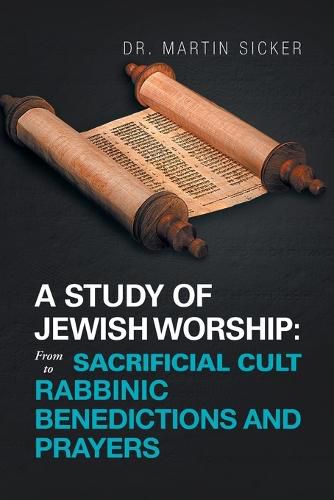Readings Newsletter
Become a Readings Member to make your shopping experience even easier.
Sign in or sign up for free!
You’re not far away from qualifying for FREE standard shipping within Australia
You’ve qualified for FREE standard shipping within Australia
The cart is loading…






This title is printed to order. This book may have been self-published. If so, we cannot guarantee the quality of the content. In the main most books will have gone through the editing process however some may not. We therefore suggest that you be aware of this before ordering this book. If in doubt check either the author or publisher’s details as we are unable to accept any returns unless they are faulty. Please contact us if you have any questions.
Judaism, the origin of which dates from the rejection of polytheism by the patriarch Abraham nearly four thousand years ago, is committed to the worship of the one and only God. In the course of that long period of devotion, the character of that worship has evolved from a primitive form to progressively more sophisticated approaches necessitated by historical circumstances. The present study is concerned primarily with the original concept of worship of the divine in the form of a sacrificial cult, conducted by a priestly hierarchy, as described in the biblical Pentateuch, and the later transition to a democratized form of verbal worship conducted by the laity in a synagogue or by the individual in one's home, as described in the rabbinic literature. One of the significant difficulties encountered in such a study is the translation of biblical and rabbinic Hebrew texts into English, which employs terminology such as 'worship' and 'prayer', terms which have no reliable biblical or rabbinic Hebrew equivalent. Accordingly, the common equation of worship, in the general sense of reverence paid to a god, with prayer, in the more precise Jewish sense of supplication or petition, can be misleading. Indeed, prayer, understood in the latter sense, constitutes a rather small segment of the voluminous liturgy of Jewish worship, much of which is drawn directly from Scripture, whereas prayer as petition, both formal and personal, is primarily the product of individuals confronting a variety of challenges to their and their coreligionists' social and physical wellbeing. The principal focus of this study is on prayer, understood in the latter sense, which is traditionally interconnected with benedictions intended to give hope to those petitioning for divine beneficence.
$9.00 standard shipping within Australia
FREE standard shipping within Australia for orders over $100.00
Express & International shipping calculated at checkout
This title is printed to order. This book may have been self-published. If so, we cannot guarantee the quality of the content. In the main most books will have gone through the editing process however some may not. We therefore suggest that you be aware of this before ordering this book. If in doubt check either the author or publisher’s details as we are unable to accept any returns unless they are faulty. Please contact us if you have any questions.
Judaism, the origin of which dates from the rejection of polytheism by the patriarch Abraham nearly four thousand years ago, is committed to the worship of the one and only God. In the course of that long period of devotion, the character of that worship has evolved from a primitive form to progressively more sophisticated approaches necessitated by historical circumstances. The present study is concerned primarily with the original concept of worship of the divine in the form of a sacrificial cult, conducted by a priestly hierarchy, as described in the biblical Pentateuch, and the later transition to a democratized form of verbal worship conducted by the laity in a synagogue or by the individual in one's home, as described in the rabbinic literature. One of the significant difficulties encountered in such a study is the translation of biblical and rabbinic Hebrew texts into English, which employs terminology such as 'worship' and 'prayer', terms which have no reliable biblical or rabbinic Hebrew equivalent. Accordingly, the common equation of worship, in the general sense of reverence paid to a god, with prayer, in the more precise Jewish sense of supplication or petition, can be misleading. Indeed, prayer, understood in the latter sense, constitutes a rather small segment of the voluminous liturgy of Jewish worship, much of which is drawn directly from Scripture, whereas prayer as petition, both formal and personal, is primarily the product of individuals confronting a variety of challenges to their and their coreligionists' social and physical wellbeing. The principal focus of this study is on prayer, understood in the latter sense, which is traditionally interconnected with benedictions intended to give hope to those petitioning for divine beneficence.